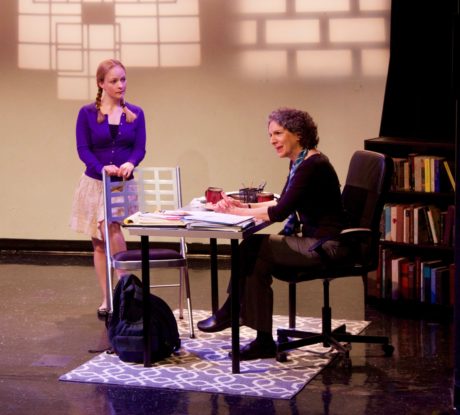“You can’t censor your creative impulses because of the danger of hurting someone’s feeling. Write don’t speak it.”
This early line of dialogue resonates throughout the emotionally rich, intellectually well-tuned, finely-acted production of playwright Donald Margulies’ Collected Stories at Peter’s Alley Theatre Productions.
Tenderly directed by Aly B. Ettman, Collected Stories has a dappled shading to it, of aching sentiment that make the production a generous character study of two woman writers of vastly different ages at much different stages in their professional careers and personal lives.

More specifically, Collected Stories is the tale of a prickly, older, Jewish, set-in-her ways, Greenwich Village-living, one-time successful short-story writer and teacher named Ruth Steiner (an affecting portrayal by Sue Struve). The other character is Lisa Morrison (played by a skilled Lizzi Albert), Morrison is a breathless, initially WASPY Valley-Girl speaking though Princeton graduate, over-eager, quite promising, seemingly needy young grad student wanting to make her way into the New York writer’s world.
When the audience first meets the two protagonists on-stage, Steiner greets the younger Morrison with this arched voiced bon mot. “Almost without exception, my students tend to look like their stories.” Why? Well the grad student before her is not quite “a serious-looking person.” Or so it seems, at first.
Needless to say, the older writer’s initial assessment of the younger writer-to-be is off the mark and will change over the six scenes and the six years that the play depicts. Over the course of an engrossing two hours the two on-stage characters a deep bond. They become personal and professional friends rather than mere mentor/mentee. In some aspects they are like mother and daughter. They even begin to share very intimate details of their personal histories. The older Steiner speaks with great sentiment of her once special love affair with a major New York writer (the real life Delmore Schwartz here in a fictionalized though key presence). Morrison speaks of her youthful eating disorders and hints at a possible unconventional family tie.
As time goes by, Morrison moves deftly, from an anxiety-ridden, needy presence to become a published and New York Times reviewed short-story writer. But her ambitions are far from satiated. A calculating and perhaps manipulative side appears. After the first publishing success of short-stories based upon her own life, she writes a novel; a fictionalized account based on the private personal life information that was shared with her by Steiner.
The play then takes the pair and the audience through wrenching struggles and the shifting power balance between the two as Lisa asserts her independence and personal power while Ruth struggles with aging and an unnamed disease. Tears are shed; but are they real or feigned?
With the acting skills of Struve and Albert, Collected Stories is refined and burnished, rather than a noisy, cheap melodrama. Its substance is a universal tale of love, loyalty, betrayal as seen by one, and disbelief by the other, all with ultimate loss. It is a production that can burn like an underground fire, even if the flames are mostly unseen as the two characters confront each other over whether a person’s intimate life events told in confidence can be appropriated by another for their own creative pursuits. Is that acceptable? Is it a betrayal?
Housed in Arlington’s Theater on the Run, the visual flair of the Collected Stories production includes the scene-changing projection design developed by Ramina Mamedova. The projections add flavor and interest to the minimal but more than adequate set design of Aly B. Ettman with lighting by Peter Caress. David G. Jung’s sound design is a standout design element. He has selected a “Masterpiece Theatre” musical tunes environment for pre-show and scene changes. It provides an overall “high-brow” essence but without being condescending befitting the New York “smart-set” characters.
Costumes by Ettman and the splendidly evocative hair-styles of Lizzi Albert change as her character’s confidence increases. Her hair styles change from youthful pigtails, to a long, bouncing ponytail, to a top-knot, to an up-do for a most sophisticated look. Her attire changes from a coltish look of skirt, blouse and sweater with flats to finally a well-tailored little black, sleeveless dress and heels. For Struve, her character has a deliberate clothes don’t matter appearance.
Collective Stories is engaging and effectively stimulating. It has a fine dramatic confrontation that takes it time to appear, but hits its mark. It is a production that brings the audience forward in their seats so as not miss words, pauses, and some well-delivered inflections or momentary physical movements. Though written in 1996, Collected Stories could easily stand for the current struggles of the Baby Boomer generation as it gives way to the Millennial generation.

Which of the two characters you may decide is more sympathetic as the victim, or more calculating as the aggressor, will depend on the “who” you bring to the show, as well as the your own past history and current situations.
Early on in the production the audience hears this; “I don’t care what the basis of the story is as long as it’s a good story.” Collected Stories is more than just a good story, well told. It is a production that will leave an audience ripe for an after show talk-back or a vigorous discussion on the drive back home. It is indeed, very good theater.
Running Time: One hour and 50 minutes, with one intermission.
Collected Stories plays through May 29, 2016 at Peter’s Alley Theatre Productions performing at Theatre on the Run – 3700 South Four Miles Run Drive, in Arlington, VA. For tickets, buy them at the door, or purchase them online.
Note: Delmore Schwartz’s (1913-1966) short story work In Dream Begin Responsiblities appeared in the first issue of Partisan Review more that seventy years ago. It is at the center of Collected Stories. Here are two links: one to the short story’s text, and the other to what some may recall from the recently departed Lou Reed.
RATING:





